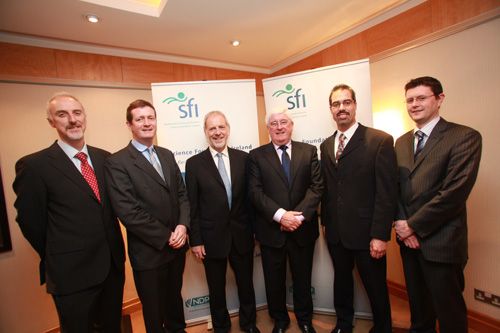TCD Researchers Achieve Success with SFI’s Principal Investigator Programme
Posted on: 30 April 2010
The Minister for Enterprise, Trade and Innovation, Batt O’Keeffe TD, announced more than €25 million in funding over the next five years for 27 research teams to carry out cutting-edge work that will generate new jobs in the ‘smart’ economy. A total of 139 researchers, who are based in our higher education institutions, will work on the pioneering projects which span the fields of energy, environmental protection, health, agriculture and telecommunications. The awards are funded under Science Foundation Ireland’s Principal Investigator Programme which supports strategic work in the life science, information communications technology and sustainable energy sectors.
Announcing the funding, Minister O’Keeffe said the selected projects had “the capacity to create new jobs in the ‘smart’ economy because they targeted high-growth areas at the cutting-edge of innovation”.
The successful Trinity College researchers were:
Information, Communications & Emergent Technologies Awards:
PI: Professor Nick Campbell, Professor Ailbhe Ni Chasaide/Dr Christer Gobl, TCD
Award: €1,232,002.90
Title: FASTNET – Focus on Actions in Social Talk: Network-Enabling Technology
This project is concerned with computer speech recognition and in particular finding ways that will help enable a machine to know what that person is doing with each utterance in a conversation. This research will produce a device for processing human speech, as part of a robot, an information-providing service, a translation service, or an entertainment system, which is able to process not just the text of that speech, but also able to interpret the intentions, or acts, of the speaker.
Keyword: Speech processing
Life Sciences Awards:
PI: Dr Kevin Mitchell, TCD
Award: €1,034,428.10
Title: Molecular Genetic Analyses of Thalamocortical Connectivity
Alterations in connectivity within the brain during development have been implicated in neurological disorders such as autism, schizophrenia and epilepsy. Dr Mitchell’s research aims to advance our understanding of how the wiring of the brain is specified during development and how disruptions in the process can lead to the development of neurological disorders.
Keyword: Neuronal Wiring
PI: Dr Ross McManus, TCD
Award: €1,053,603.40
Title: Post-genomic investigation of coeliac disease susceptibility genes
Coeliac disease is a common, inflammatory disorder caused by intolerance to wheat. Dr. McManus and others have identified DNA variants in genes which increase the likelihood of an individual developing the disease (i.e. susceptibility genes). This research programme aims to understand how the identified DNA variants result in illness through a range of cutting-edge genomics and cell biology approaches.
Keyword: Inflammation
PI: Professor Dan Bradley, TCD
Award: €1,231,732.00
Title: Bovine Genetic Variation and Disease Susceptibility
Tuberculosis in cattle, mastitis and perinatal mortality (death of newborn calves) together comprise a significant burden to animal health and represent an economic challenge to one of Ireland’s largest industries. Each has a genetic component which will be examined and researched allowing the identification of genes that are a matter of life and death in these conditions. Drug development will help us to breed more disease resistant cattle. Genetic testing for these genes will help in the marketing of Irish bull semen in a competitive international marketplace.
Keyword: Genetic Testing.
PI: Professor Mathias Senge, TCD
Award: €931,806.20
Title: Molecular Tuning of Porphyrins for Biomedical Applications
This project looks at the synthesis and applications of a particular family of molecules, porphyrins, which are found in various coloured pigments (e.g., chlorophyll, haemoglobin) and which have a variety of biological functions. Here, the reactivity and structure of porphyrins and similar molecules will be controlled to develop light-activated systems for various applications. Such complexes have potential in both the life-science arena – for use in tumour targeting and enzyme design, and also in more physical.
Keyword: Porphyrins
PI: Professor Martin Hegner, TCD
Award: €1,408,933.20
Title: Nanomechanics of molecular motors and cantilever array bio-diagnostic devices
Prof. Hegner’s research is in the rapidly advancing area of bionanotechnology, where biology provides the inspiration, and often the materials, for the design of new technologies at very small scales. There are two main themes to this research project: In the first part, state-of-the-art techniques will be used to understand the mechanics and forces existing in motor proteins and mitochondria, which are viewed as ideal biological models for utilisation in future nanotechnology-designed devices. The second theme utilises very small electromechanical systems and cantilever-based sensors and diagnostic devices for such areas as vaccine screening and immunological assays.
Keyword: Bionanotechnology

Pictured at the announcement were (l-r), Professor Dan Bradley, TCD, Dr Ross McManus, TCD, Professor Frank Gannon, Director General, SFI, Mr Batt O’Keeffe TD, Minister for Enterprise, Trade and Innovation, Dr Kevin Mitchell, TCD, and Dr David G Lloyd, TCD.
